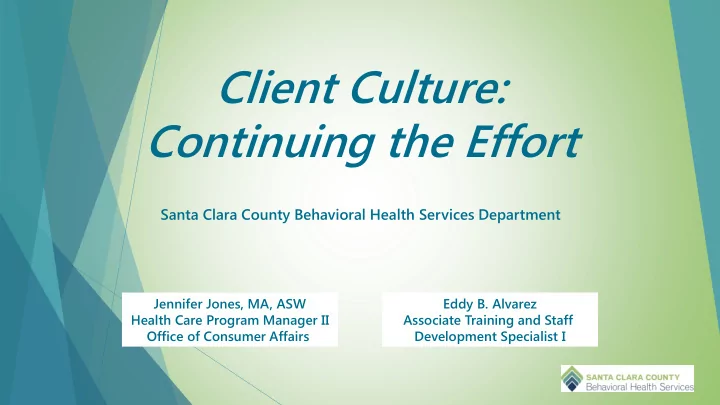

Client Culture: Continuing the Effort Santa Clara County Behavioral Health Services Department Jennifer Jones, MA, ASW Eddy B. Alvarez Health Care Program Manager II Associate Training and Staff Office of Consumer Affairs Development Specialist I
Welcome & Introductions
Objectives By the end of this training, participants will: 1. Increase their level of awareness and understanding of client culture. 2. Gain knowledge of the multilayered complex challenges that clients experience, through their shared lived experiences. 3. Increase their understanding that people with mental health concerns can and do recover and live fulfilling and meaningful productive lives. 4. Encourage the individuals they provide support and services to, to always have hope that, they’ll be in a better situation when they continually work on their wellness and recovery.
hope ~ recovery ~ resiliency
What is Client Culture?
Psychiatric Survivors Movement (more broadly consumer/survivor/ex-patient movement) 1 Grew Out of Struggle for Rights & Empowerment 2 International Conference on Human Rights and Against Psychiatric Oppression, Vermont, 1985. 1. https://www.routledge.com/products/9780415804899 2. http://www.ncmhr.org/history.html Image: http://static1.1.sqspcdn.com/static/f/784909/22686661/1368549604063/VOCAL+presentation+by+Joseph+Rogers+052113.pdf?token=g1kBXZ9oONUrnmwRQBcpjd69fUg%3D
Definition of Client Culture “Mental health clients bring a set of values, beliefs, and lifestyles that are molded, in part, by their personal experiences with a mental illness, the mental health system and their own ethnic culture... When these personal experiences are shared, mental health clients can be better understood and be empowered to effect positive system change .” DMH Info Notice 02-2003 Source: www.dhcs.ca.gov/formsandpubs/MHArchives/InfoNotice02-03_Enclosure.pdf
hope ~ recovery ~ resiliency
Definition of Client Culture, cont’d. The definition of the term “Client Culture” incorporates how a client’s experience of a psychiatric distress and of interacting with the mental health system will be used to develop a competent service provider system that is sensitive to the “client culture” . DMH Info Notice 02-2003
Impacts on the Quality of Life Diagnosis/Labeling Housing Medication Feeling Different Culturally & Linguistically Hospitalization Incompetent Services Stigma Forced Treatment Economic Impact Incarceration Image: https://twitter.com/active_minds/status/542015564777271296
What is Stigma?
In the Media
Stigma: Language Matters Source: http://www.onourownmd.org/wp-content/uploads/2011/12/LM-Flyer.pdf
Person-First Language Source: www.hogg.utexas.edu Hogg Foundation for Mental Health “Language Matters in Mental Health”
hope ~ recovery ~ resiliency
Definition of Stigma noun stig·ma \ ˈ stig- mə \ : a set of negative and often unfair beliefs that a society or group of people have about something “ An attribute, behavior, or reputation which is socially discrediting in a particular way: it causes an individual to be mentally classified by others in an undesirable, rejected stereotype rather than in an accepted ‘normal’ one. ” Image: http://jessicamaccormack.com/category/medium/drawing/ Source: http://www.merriam-webster.com/dictionary/stigma
Fundamental Values of the Mental Health Services Act (MHSA) 5813.5 (d) Planning for services shall be consistent with the philosophy, principles and practices of the Recovery Vision for mental health consumers. (3) To reflect the cultural, ethnic, and racial diversity of mental health consumers.
hope ~ recovery ~ resiliency
The 10 Guiding Principles of Recovery 1. Self-Direction 2. Individualized and Person-Centered 3. Empowerment 4. Holistic 5. Non-Linear 6. Strengths-Based 7. Peer Support 8. Respect 9. Responsibility 10.Hope Source: http://store.samhsa.gov/product/SAMHSA-s-Working-Definition-of-Recovery/PEP12-RECDEF
The Pieces of Wellness Peer Employment Holistic Support Self-Help C Recovery h Peer Advocacy Centered Client Driven o i c e Voluntary Empowerment Community Based Diversity
Complementary Behavioral Health Services Self-Advocacy Self-Help Peer Advocacy and Support Education Political Activism Empowerment Spirituality
Self-Advocacy “Knowing what’s right for me, and being able to say so .”
Self-Help
Peer Advocacy and Support
Education
Political Activism
Empowerment
Spirituality
hope ~ recovery ~ resiliency
Self-Help and Peer Support Hearing others have been through what I have been through Helping someone navigate the system and avoid heartache Learning that I am not alone
hope ~ recovery ~ resiliency
Advantages of Having Peers within the Behavioral Health System They have experience, exposure and understanding of the MH system It’s a way for them to give back They can be role models It builds their skills It increases their standard of living since they earn incomes It decreases stigma through the relationships they build It decreases the “us versus them” mentality
Advantages of Having Peers within the Behavioral Health System Increases personal experience of the process of recovery Reduces discrimination and stigma Increases success in engaging some clients who may be hard-to-reach It somehow encourage providers to focus more on: Wellness instead of the Illness Success vs. Failure Abilities vs. Disabilities
hope ~ recovery ~ resiliency
Bringing It All Together
A Belief in Wellness & Recovery “Recovery from a mental illness is not only possible, it is to be expected.” Commission on Mental Health-2006
[type panelist’s name here]
Recommend
More recommend